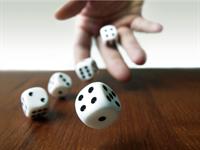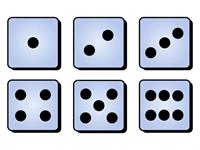PDF chapter test TRY NOW
Random experiment
The experiment where the results can not be controlled or predicted though the results are known is said to be a random experiment.
Example:
Rolling a die.

Outcome
Every result of an experiment is an outcome.
Example:
On a random experiment of rolling a die, the possible outcomes are 1, 2, 3, 4, 5 or 6.

Equally likely outcome
If the chances of occurrence of an outcome in an experiment are the same, then the outcomes are said to be equally likely. In other words, the probability of each outcome is the same.
Example:
On rolling a die, the chances of occurrence of each number is the same as the other.
That is:
Probability of getting the number 1 = \frac{1}{6}
Probability of getting the number 2 = \frac{1}{6}
Probability of getting the number 3 = \frac{1}{6}
Probability of getting the number 4 = \frac{1}{6}
Probability of getting the number 5 = \frac{1}{6}
Probability of getting the number 6 = \frac{1}{6}
Event
Every outcome of an experiment or the collection of outcomes of an experiment is referred to as an event.
